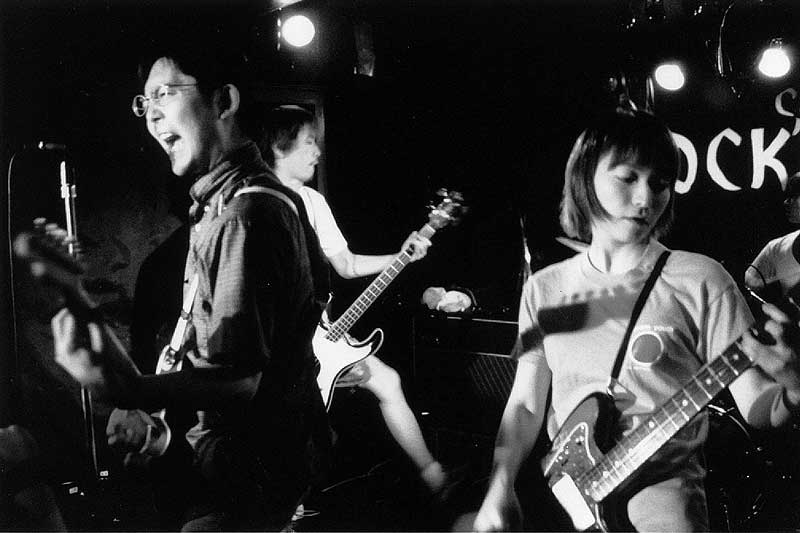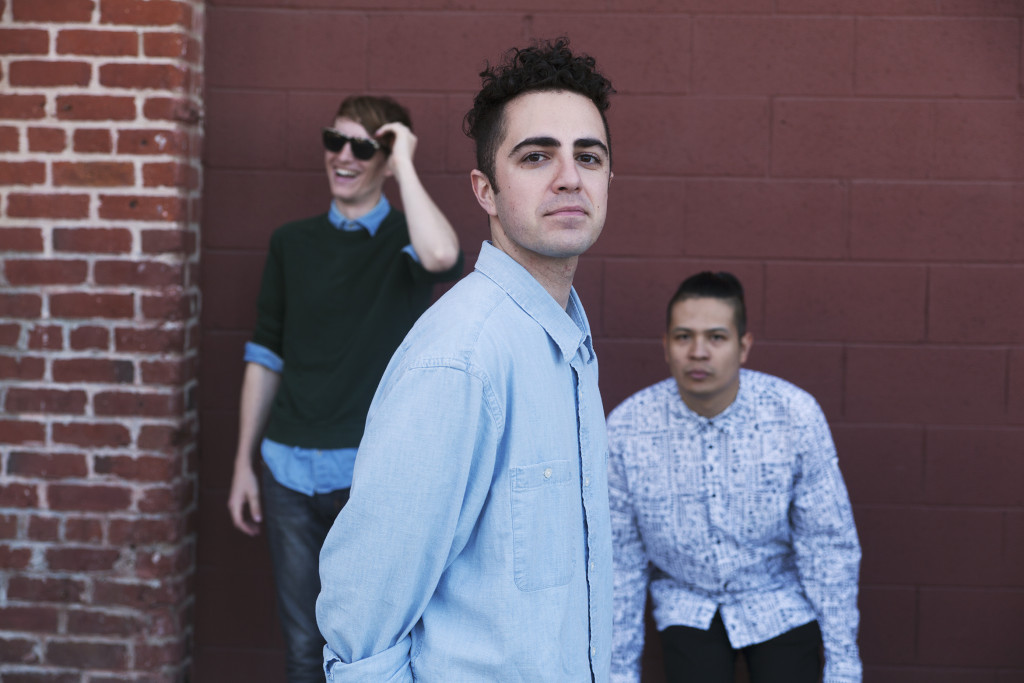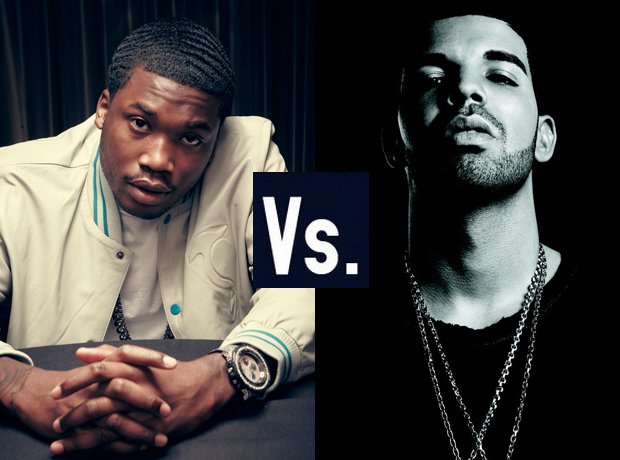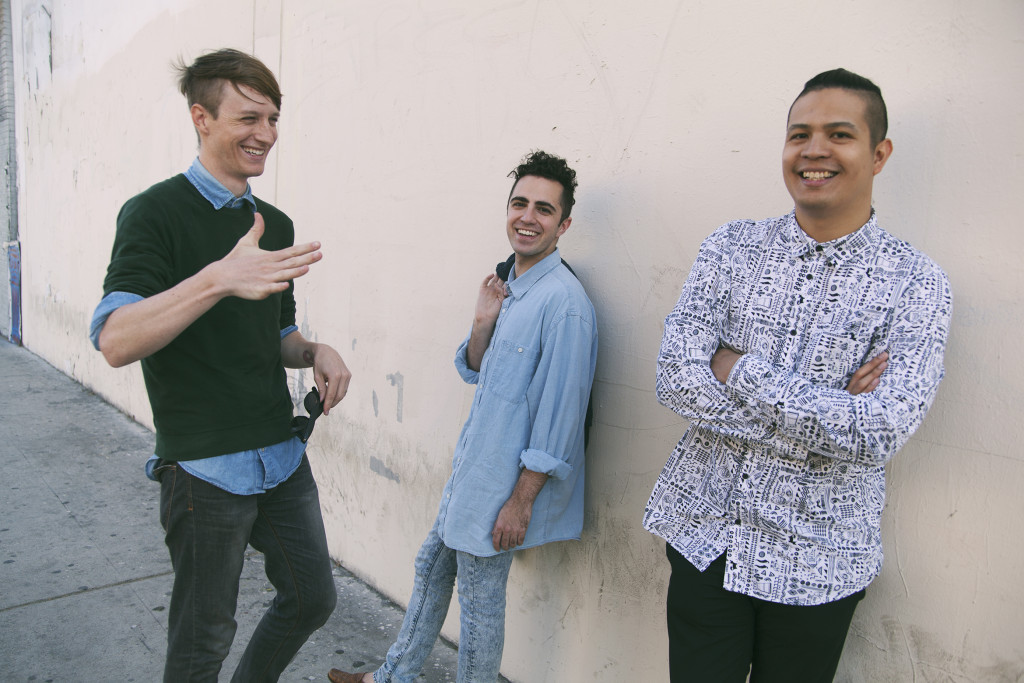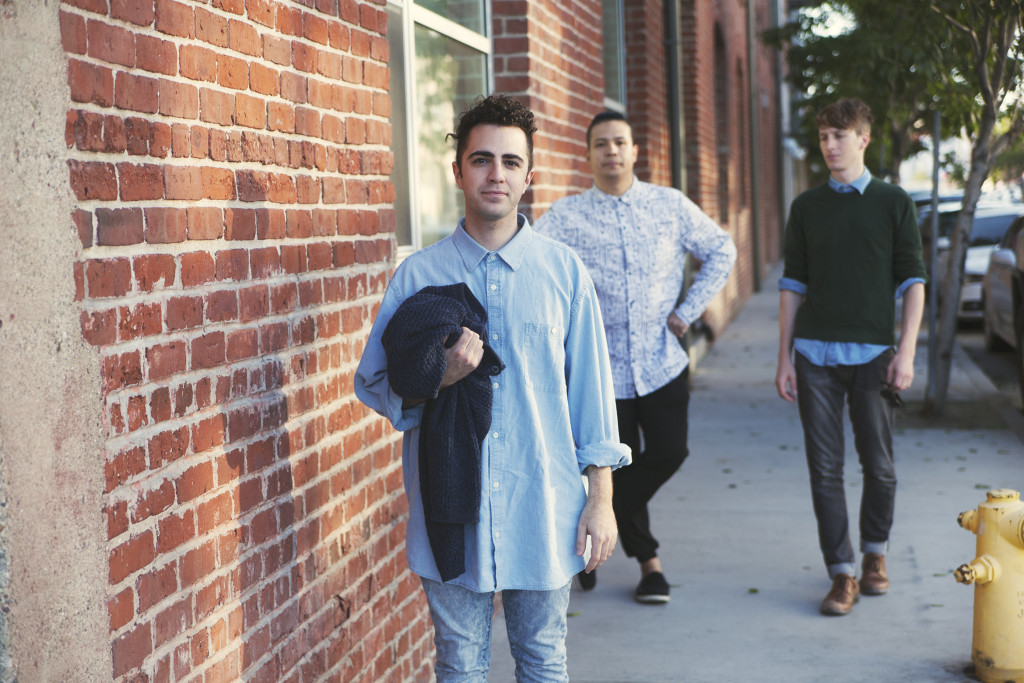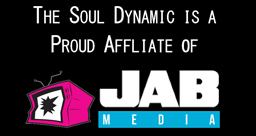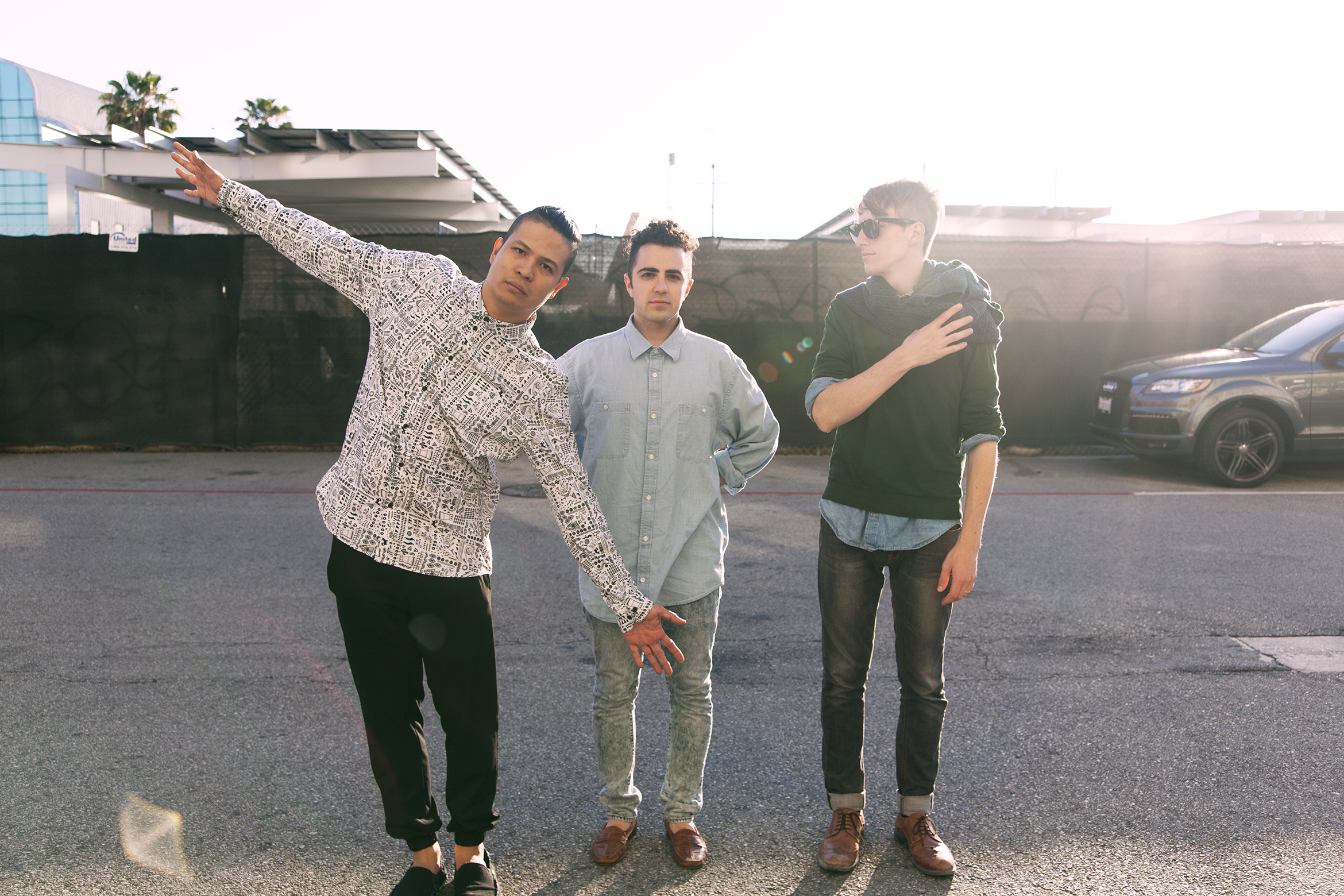
Theirs is an upbeat sound that met and got entangled with the realities of life, becoming what we’re all kind of striving for — Splendor. The band? Two Cheers. Along with being a pleasant destination for our minds, Splendor, also acts as the title of their latest album. It’s poppy, melodic, filled with juicy hints of the Flaming Lips, the Cure and the Pixies dripping all over. It’s good and you should bite into it when you have a minute. In speaking with Two Cheers front man Bryan Akcasu, we learned about the renaissance of Detroit Rock City, his take on Drake vs. Meek Mill and the do it yourself mentality that’s the driving force behind the talented Michigan based crew.
The Soul Dynamic | You’re from Michigan, but you guys just moved from L.A. to Detroit – two parter, how did where you grew up influence your music and how did you end up in Detroit?
Bryan Akcasu | I’m not really sure how it influenced me. I think that Michigan …I can only compare it to Los Angeles. But it’s a place that has seasons and a cycle of life, and the nature is really in your face all the time. When you go to L.A., it’s like time doesn’t pass. It’s the same day over and over and over. L.A. is super, super fast paced, it’a crowded and it’s always awake. That’s not my personality. I have moods, I like changes and seasons. I like being in a place where there’s cycles and there’s Winter. I really like Winter, I keep telling everyone. They’re like, “no you’re moving back from L.A., you’re going to be so cold in the Winter.” I’m like no no, I’ve been too hot for too long.
Second answer. My family lives out here, that’s one thing, it’s more practical. The more adventurous reason why I like Detroit right now is because New York, Nashville and L.A. are — they’re all fed up. Everything’s running smoothly and they do what they do. Detroit is rebuilding, it’s cheaper to live here and there are a lot of other artists, entrepreneurs who are coming here to follow their dreams, to start their businesses because they can survive here. It’s a different atmosphere than a place that’s really competitive like Los Angeles or New York. And it’s fun to be in an environment where things are a bit uncertain, rehabilitating and things are sort of popping up everywhere. It’s a vibe more than anything, and you can read articles all over the place about Detroit and how it’s coming back and how there’s a certain renaissance happening. I’m really excited for Autumn, I’m really excited for Fall, I can’t wait.
SD | I agree, that Cali weather can cause stagnation, things you don’t need. All right, what or who has been the biggest influence pushing you to make music?
BA | Whenever I see something I really like I want to figure out how it works. Music was the thing I loved the most, so that’s what I wanted to do the most. I love it.
It’s just listening to bands really. One band I have to mention is this Japanese band called Number Girl. They broke up, but they were so, so awesome. No one’s ever heard of them here and I stumbled upon them through some blog who was writing about them, so I went to Little Tokyo in Los Angles and picked up their CD. I really loved their CD. And it occurred to me one day when I was younger that I felt self conscious about my music, and I didn’t think I was very good. So this band (Number Girl), they’re loud, Pixies style, really rough, sing in all Japanese, have lots of angular, harsh sounding guitars and distorted drums and stuff. And I was thinking, if this punk band from Japan can touch me from across the sea and inspired me, then I can possibly make some music and somebody out there will want to listen to it. That what keeps me going, having this feeling that somebody out there will listen to it. And I got that from this Japanese band that no one’s ever heard of, and their not even popular in Japan, but somehow they made me want to start my own band.
SD | Solid, that’s a great answer.
BA | Another thing. When I was in high school, I was going to a public school and my Sophomore year and I felt completely out of place, like I was wasting my time. So I convinced my parents to let me drop out of school and home school myself for the rest of my high school years. I have to say that was really good parenting on their part. I ended up determining my own schedule everyday and determining what I was going to do and they let me do it, make my own classes…so I would basically write songs. And that was my class, I would rock out on guitar, record songs, keep track of them and make changes. So I have to put them in the mix too because they let me do that.
SD | Yeah you don’t hear about that a lot. How did they make sure you were doing what you were suppose to be doing? How did they make sure you stayed on point with your work? Especially if you were just playing music.
BA | I wasn’t only playing music, I was reading a lot of books, writing essays. I actually took college classes, science classes…I don’t think they really had to worry about me that much because I liked doing this thing (home school). I wasn’t made to go to school, so I schooled myself. I don’t know I’m just that kind of person.
SD | Yeah you sound like a self-starter, DIY kinda of dude who follows his intuition, which has somehow lead you guys back to Detroit. That’s cool man.
BA | It could be a terrible mistake for our career, but…
SD | Well hey that’s part of the journey, if it’s a mistake, you’ll make another move to fix that you know.
BA | It doesn’t have to be a permanent thing, if it doesn’t work out I can try something else. It sounded like a really good idea at the time, and I thought about it in a rational way, hopefully it will…
SD | It will work out, I’m sure of it. I’m a positive person so that’s just my outlook on things.
BA | (Laughing) Yeah, not everyone’s that confident.
SD | Fuck them (more laughs). No really that’s cool man, I think it’s all about your drive and ambition and being genuine to your art and if you guys as a group feel like it was the best move for you — it probably was.
BA | Yeah I think it will be fine. There are a lot of bands that have come from Detroit over that last couple years. I may be really naive, but I think if someone else can do it, we can do it, for better or worse.
SD | I dig that a lot. So we do this thing called Versus. It’s five quick hitting questions, where we list off popular topics like, “Arcade Fire vs. Vampire Weekend,” you pick one you prefer and we go onto the next one. Also if you feel the need to explain yourself, by all means we welcome that! However you want to answer these, is the right way to answer these.
Drake vs. Meek Mill | Can I pick KRS-One instead? I mean we don’t know if Meek Mill is talking out of his ass, we don’t know if he’s just talking shit. And now Drake is making these songs and I read that he gave $75,0000 to Meek Mill’s high school or something like that. I don’t want to talk about them for the same reason I don’t want them to talking about each other —because everybody has things that are their business. I don’t want their business to be my business.
Donald Trump vs. The Field | I’m not interested in Donald Trump at all. I don’t have a whole lot to say about that.
The Cure vs. The Flaming Lips | Flaming Lips! I like the Cure, don’t get me wrong. But some of those Flaming Lips songs — they blow my mind. Like, “Do you realize??” blows my mind. And the album Clouds Taste Metallic is probably one of my top five favorite albums ever. You can kind of hear a little bit of their sound in our sound I think, because we have a lot of the same big drums and melodic bass lines, and a similar melodic vibe. I just love that album, it’s so good.
Old School vs. Anchorman | I don’t remember Old School very well, Anchorman.
SD | All right so that’s the end of that line of questioning. You recorded your last album in your apartment, can you go into what kind of experience that was and what were the challenges their versus recording in a traditional studio?
BA | Remember earlier how I was saying that I’m kind of DIY? I haven’t had a whole lot of experience recording in the studio. The few times I have I felt really uncomfortable. In my mind the question is framed the opposite way. I have this intuitive way that I work, the way I write songs, and record them — it’s one process. I don’t like writing the song and recording it somewhere else. It’s one big step to me and I’m so used to doing it myself, I’m so used to doing it that way, and my band really likes doing that too, because they have so much flexibility. They can come over whenever, drink wine or something and play. So I can only compare and contrast really. We paid for this really cool studio in L.A., we recorded a song there, but we were on the clock and we were all trying to get stuff done…We’re so used to improvising on the spot and coming up with things and letting things evolve, but when you start recording a section on guitar in the studio, and then you listen to it a few days and think, “well I should of done it like this instead,” you usually go back and rerecord. But when you’re paying for things out of pocket you have to get it right the first time, it’s a completely different way of working.
In the apartment I try to capture the improvisation so our recordings have some of that type of construction, that looseness, and I’ll centralize it. That’s the kind of music I like, Van Morrison and Bjork, spontaneous sounding stuff that still has life in it. I don’t know how to do that in a studio where I’m paying and I only have a few hours to get it all right. I mean there are times where I spend a few hours on the vocal and it’s all bad, and I stop and I go eat dinner and I brush my teeth and I’m about to go to bed and I stop. Then I feel it. And I have to be able to go into my apartment and record in that moment. You can’t do that in a studio you’re paying for. It might not be as good a quality as far as the sound mix, or as far as the production quality, but it will have that thing that’s more important — that life to it — that feeling you can’t fake.
SD | I totally get the idea. Sometimes it’s hard to be in the moment if you’re not in the moment. It becomes more of a feeling, and doing it the way you guys are doing it allows you to drop everything once you get the intuition and just go with it. That approach is fresh. I understand you’re a former chemist, how did you get into music while doing that (being a chemist) and how do you fully transition into music as a full-time thing?
BA | I was doing music long before I was a chemist. It just takes a really long time to be good at music. You just can’t go to school for four years and get a degree. You have to spend a lot of time and write a lot of bad songs, and I was doing that long before I went to college. And I wasn’t really sure if I wanted to spend my life trying to make music, cause it’s scary. And then, you start making money and you feel comfortable and you have relationships, a normal life and it feels good. But then along the way I started writing what I thought, and what other people around thought, was good music. So I started spending more time on it, taking it more seriously, taking myself more seriously, my talent more seriously. And I let that creative side of me loose.
I think I’ve done it without having that full time job because, being a chemist was really creative. I asked myself at a low point, a time of frustration with my music, “Why am I not writing the type of music I want to be able to make? What is holding me back? How can I be so creative and productive at work with these formulas that I don’t really even care about — why can’t I do that with my songs?” So I translated my approach from chemistry, making these formulas, into my music. And I started thinking of my songs in the way I thought about my formulas. And it was actually extremely liberating, because I never got attached to a bad song anymore. I started writing just a ton of songs, lots of them. I didn’t care if they were bad, I would just sit down and write a song. And I found that I didn’t have to be in the mood or in the mindset. I wasn’t waiting for inspiration anymore, I would create something and then be inspired by what I created and be touched by it, and that would be meaningful to me. I didn’t have to start out with something meaningful and grind away at it until it was perfect. It was more of a zen approach, where I would crank something out and if didn’t work, it didn’t work I’d let it go, kind of like my formula. If it’s not working, it’s not working and let it go. That was huge.
I’m not working right now (Bryan saved money as a chemist) and it’s a little bit scary, because I’m a lot poorer now, but it is cheaper to live in Detroit. I’m trying to approach the leg work as my job. So I wake up early, I exercise and I have a detailed hour by hour schedule of how I approach my day. I’m crazy about schedules. Now I’m just trying to get out on the scene, see more bands, build relationships and continue to build a community with other artists. I’m constantly reading about how we can promote ourselves so I don’t have to hire a PR person and researching about how can I become my own publisher. That’s something I want to do. It’s not really romantic, but…
SD | Yeah you have to hustle, that’s the only way to do it. And I think everybody, every band, every artist now realizes that. Some do it better than others, some have a little more money to help them out along the way. Every band has to figure out their own way to do it, and it sounds like you’ve figured out yours, and like you said — you’re tweaking it every day, working at it. It’s about the process more than anything else.
BA | Yeah hustling is a great term for it.
SD | That’s what it is, work.
BA | Yeah and we embrace the challenge, it’s fun. How can I accomplish this seemingly impossible goal of mine, it’s perverse (he laughs)?
SD | It’s cool, I respect that, because there are a lot of people in that situation. What’s the best part of the music industry today and what’s the most frustrating?
BA | It seems like a pretty good time actually. I don’t think I could of done this 15 years ago, 20 years ago…be able to tweet my own music, put our stuff on youtube for people to find, get all these blogs to write about us. It’s amazing! The challenges are that there’s a lot of work and I might not make it. I might not accomplish my goal, but it was always like that. It scares me a little when people say,”‘Well Spotify isn’t giving artists very much money,” but it’s more about entrepreneurship now, it seems democratic. You can work really hard and you can get somewhere and…I don’t think about it too much. I’m just doing and it and I’m grateful. I don’t have to be a superstar, I just want to make a living. There’s a lot of people doing it and I want to do it too. It’s a great time to be this kind of artist.
SD | You don’t have to answer this question, but there’s a lot going on in the U.S. right now, if you were the President of the U.S. right now, what would you change about our country?
BA | Hmmm, that’s tricky. Our album is about, to a large degree, turning inwards and seeing the world in a different way completely. And realizing the value of people and the actual world. Not the world in the news, or society, or your mind — but the actual world, the people you actually meet: their blood, their hair, their skin, their lives. And I feel because we have TV and the internet, there’s a little bit of a problem with modern society thinking of things in terms of symbols instead of reality, actual reality.
I want to see the world in a very clear way. Unobstructed by propaganda, unobstructed by talking points and what people write in the news for instance. I don’t really know how the people of the country can start to change their consciousness, I hesitate to give any advice, or to tell anyone that their beliefs are wrong, or their beliefs are destructive. Obviously I have the way I feel. Tolstoy. He was this radical Christian, also a pacifist and he believed that people should live by a code of conduct and they should take it seriously. He said you can’t change other people’s mind, you can only do, you can only act, in the way you want other people to live. You have to carry out your philosophy. You can talk about it, but don’t expect to change people’s mind — you have to make it happen, live in the way you want other people to live.
SD | Perfect. What do you want people to take away from your music? You kind of alluded to it in your previous answer, but what kind of story are you trying to tell and what kind of impact are you trying to make?
BA | I feel really strongly that the lyrics on the album tell a story. It’s about someone who reevaluates their day-to-day life. And realizes that they were looking at the world through a singular screen. It’s about destroying your ego and being able to step back from your woes and worldly problems, and being able to see a certain kind of harmony and reverberation from the things that were pressing you — and realizing that your heart, and your mind and your spirit can also be free. I want people to see that.
I also want to try and make myself an example. I want to try and be someone that shows other people that they can express themselves. They can buckle down and do what they want to do. And hopefully I don’t fail. So many people go through their lives doing stuff they don’t want to do and life is too short to do that. You don’t have time to do that. I say to myself, “you don’t have time to do some of the things that you’re doing, it’s not worth it.” But I want to be someone who shows people that it’s fun and its scary, but you can go out on a limb and have an adventure, and yeah you might even fail. I might even end up on the streets. But I decided that ending up on the streets wouldn’t be the worst thing in the world, as long as it happens because I had a vision I was trying to see through.
SD | Yes, yes. Here’s the last question, it’s the question we ask everyone and it goes back to what we were talking about at the top — what inspires you?
BA | It’s a pretty cheesy answer, but I have a psychedelic experience sometimes, where I see the world and crush on it. The harmony and the nature and the things happening, and it’s just the fact that things are happening and they don’t have to be happening. You can look at the world in a certain way, like wow, “Ducks are so weird, or look at all these different types of trees.” It sounds trite, but it astounds me that there’s something rather than nothing. That’s what inspires me, it’s a very fundamental thing. You wake up, and it’s like holy shit, I’m awake and there’s another day happening.
You can check out Splendor below via the Soundclouds. As an editor, it’s really tough sometimes to break down the essence of a person or band. I really wanted to post our entire conversation, which lasted over an hour and change. What I can say is that Bryan and his band embody the spirit or our publication to a tee. We’re a do it yourself, go and get it publication that is well aware no one is going to give us a damn thing. Two Cheers knows that too, and lucky for you, they’re doing something about it.
